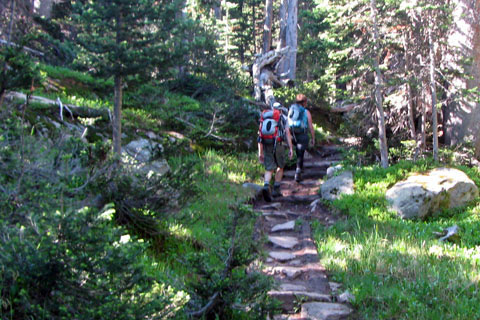| 355 | LNT - Plan Ahead and Prepare | 2011-02-28 |

Years ago (before Leave No Trace was an organization) I was co-leading a backpacking trip to the mountains. We spent our first evening together, before the trip started, going over a detailed packing list with each backpacker. Each person then took home the packing list and an assigned Kelty frame pack to fill that evening. The next day, we would distribute group gear, travel to the trailhead, and begin our week long trip.
It was a beginner's backpacking trip and most of the participants had no experience. One of the safest routines to follow to ensure proper packing is for everyone, including the instructors, to take everything out of their packs and re-pack together. Most of the time the beginners will pack true to the list or at least their interpretation of the list. The shakedown, just helps weed out those few unwanted pounds.
During the shakedown on this trip, to our surprise, one woman disregarded our list and made up her own. As she unpacked we found that she had a complete change of clothing for each day, a voluminous hardback book, and of course her large make-up kit. We tried to get her to reduce the weight of her pack; but she would not do it. If she was going to live in the "woods" she was going to do it in style.
By the time the group gear was distributed, her pack was large and heavy. I would have hated to have tried to carry it. We were finally able to talk her into leaving a couple of sets of clothing behind; but she would have rather left her food and water than her makeup. Confidently, she hit the trail carrying the heavy pack as she tried to climb the first hill.
Naturally she was not able to carry her pack. She wanted to leave her clothes stashed along the trail; but we were doing a loop and were not retracing our steps - we would not let her. She begged others to carry some of her gear. She slowed the group so much that we had to have a group meeting. After a brief session, everyone took some of her gear to make her pack more manageable; but she still had a rough time.
A good lesson for this adventurer to have learned was the first key principle in the Leave No Trace ethics - Plan Ahead and Prepare. By planning and preparing, the outdoors person is able to live in the wilds at peace with the land.
A few tips to Plan Ahead and Prepare...
Keep packing lists for each trip.
Comment on each packing list. What did you need and what could have been left behind.
Revise the packing lists.
Check for specific regulations at the Park or land management agency where you are going. In Colorado, for example, there are several different National Forest. Each land jurisdiction has it's own regulations. The rules are different.
Sadly enough, I have never seen a National Forest Ranger in the backcountry doing patrols. More than likely, despite whatever the rules are, you will be the one that enforces the rules on yourself (and your group). Just because someone has already built a campfire in a no campfire zone does not make it right. Live by your ethics.
In the National Parks there are Ranger Patrols and the rules are enforced. If you need help living by the Leave No Trace Ethics, go to the National Parks, the Rangers will help you.
Research the climate and weather of your outdoor adventure area, pack accordingly.
Over-packing tempts the packer to leave things behind.
The under-packer (going lightweight) may not carry crucial pieces of gear in order to have a lighter pack. The ultra-light adventurer might be forced to violate a Leave No Trace Principle or land management rule for the sake of survival. For example, the ultra-light packer does not carry enough clothes; then gets cold and reasons that they have to build a fire to warm themselves - even if fires are not allowed.
Minimize food packing.
Carry food that you like to eat, that hopefully will keep waste to a minimum.
The first few days of a trip you will probably be less hungry than later on in the trip. Plan your food accordingly.
Keep portion sizes small and supplement the meals with extra snacks.
Beginners do not know what to plan or pack. It is a good idea for them to begin by going on a short distanced, overnight trip before hiking the Appalachian Trail. The beginner can then progressively increase the distance traveled and the number of overnights as they gain experience. Joining a group or taking a class might help jump start your adventures.
The Leave No Trace Principles are the minimum standard. You can make your own outdoor ethics. Take the Leave No Trace Principles and go a step beyond. Cover all the basic ethics suggested in the Principles; but learn to do things even better.
Teach others to Leave No Trace.
Happy planning and preparing trails.
On Wednesday (3/02/11) we will be posting our basic day hike packing list.
Leave No Trace